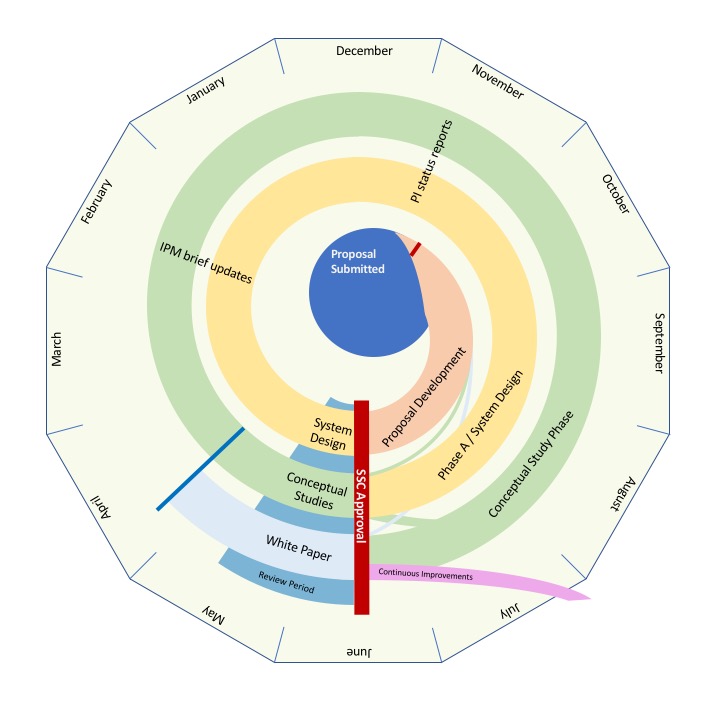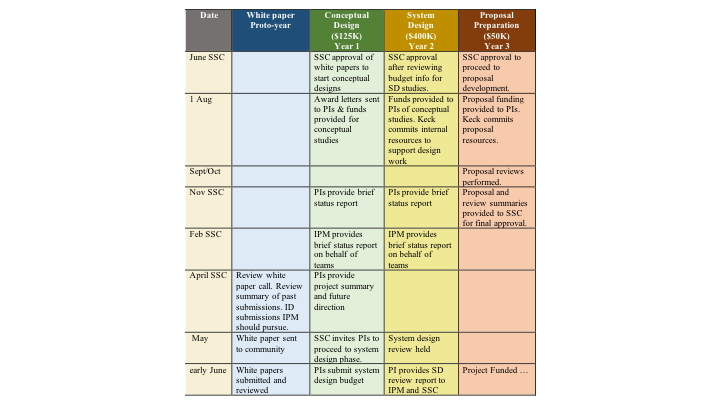
The incubation process supports a wide range of initiatives that spans from major new facility class instrumentation to small continuous improvement projects for the existing instrument suite and observatory systems. The SSC will confirm the scale of the project and suggest the right path forward if approved.
Due to funding limitations, not every project the SSC deems worthy for continued development will be funded through this process. The SSC will provide all PIs feedback on proposals and guidance for moving forward.
Dear Colleagues:
W. M. Keck Observatory (WMKO),
in concert with its Science Steering Committee (SSC), announces an instrument
development call soliciting requests to fund up to $175k in support
of:
All reports and endorsement
requests should be submitted in pdf format by 20 June 2024 to whitepapers@keck.hawaii.edu, and all requests will be reviewed
by the SSC in early July. Status reports must address SSC comments on previous
submissions and highlight updates or progress.
All members of the WMKO community
are encouraged to participate. All major instrumentation concepts suitable for
a large telescope as well as upgrades to our existing instrument suite are
encouraged.
Please note that in 2023, WMKO
completed a strategic plan, Keck 2035: The W. M. Keck Observatory Strategic
Plan (see link below). Based on current recommendations, WMKO encourages teams
to review the strategic plan and ensure that development efforts for instrument
and technology studies focus on aspects of that plan such as:
1. Adaptive Secondary enabled
instrumentation and systems.
2. Near diffraction limited
capabilities at the shortest possible wavelengths
3. Enhancing the community’s
advantages in cadence, time domain, and large sample programs for precision
spectroscopy, photometry, and astrometry.
4. Instrumentation that takes
maximal use of the summit conditions with an emphasis on good seeing and UV
sensitivity.
5. Demonstration capabilities with
science applications for future WMKO instrumentation, ELTs, or space-based
missions.
6. Data reduction software that
improves or builds on packages for existing instrumentation or develop new
tools that address identified needs for strategic science initiatives.
The above topics should not be
limiting; white papers are encouraged in any of the areas of interest
identified in the strategic plan that is accessible at: https://www2.keck.hawaii.edu/inst/scistratplan/Keck_2035_Science.pdf.
A white paper status template
is available at: https://www2.keck.hawaii.edu/inst/common/Instrument_Development/InstrumentDevelopment.php#template. If effort is required from WMKO staff, please specify the
hours, and if possible, staff needed to support your project.
Relevance to future new
facilities (e.g., EUCLID, LSST (Rubin Observatory), Roman, and ELTs), if any,
should be explained. Re-submissions of previous proposals must address SSC
comments to the previous submission and highlight updates or progress. Please
note that visiting instruments will not be considered.
WMKO funds feasibility and
Phase A requests with the goal of developing early designs into a competitive
proposal for future general funding opportunities (e.g., the NSF MRI, MSIP, MsRI, and/or ATI programs). Details for the funding
categories are below:
Concept designs: In
2024, funds are available for concept and feasibility design studies. The
amounts awarded will depend on the number of proposals accepted and the budgets
proposed. The request should be no more than three pages in length devoted to
text, figures, and tables. Up to two additional pages are allowed for a budget,
milestones, and deliverables.
Phase A System Designs:
In 2024, funds are available for projects that have already developed
feasibility designs either internal or external to the WMKO instrument
development call. PIs submitting Phase A proposals are ready to pursue system
design level activities in preparation for submitting proposals. Proposals
wishing to exceed this amount or that would like a multi-year commitment must
provide compelling justification. For Phase A system design proposals, the
project description should be no more than 7 pages devoted to science cases,
conceptual designs, and a preliminary budget and schedule for the full build of
the instrument. Up to two additional pages are allowed for the Phase A
system design budget, milestones, deliverables, and references for the proposed
work.
Proposal Development:
Instrument teams that have completed phase A activities either internal or
external to the WMKO instrument development call may request permission and
support of minor cost efforts to develop a proposal for a public grant program
or a philanthropic opportunity. PIs are encouraged to assess how an allocation
of observatory nights may strengthen a proposal either for general use or for
some key science initiative. PIs that want to include nights in a proposal must
provide a description and justification for the use of those nights. PIs are
encouraged to view the web document describing examples and contact the
Instrument Program Manager for guidance on night allocations for proposals.
Funding is drawn against the total available for Concept and Phase A designs. The
request should be no more than three pages in length devoted to text, figures,
tables, and budget.
Mini Grants: Minor
upgrades for software, DRPs, and hardware to existing facilities to add or
enhance current instrument or AO capabilities may be proposed and funded by
WMKO. Funding is drawn against the total
available for Concept and Phase A designs. The request should be no more than three
pages in length devoted to text, figures, tables, and budget. Up to two
additional pages are allowed for a budget, milestones, and deliverables.
For all requests, the budget
should be in summary form identifying how the money will be spent on major
study costs. If effort is required from WMKO staff, please specify the hours
and staff needed that are in addition to the funds requested. All requests
shall provide administrative and financial contact information for the PIs.
To gain an initial
understanding of technical issues such as existing instrument configurations,
observatory interfaces, and guidelines for the standard WMKO instrument
development process, proposers are strongly encouraged to contact the WMKO
Instrument Program Manager, Marc Kassis (mkassis@keck.hawaii.edu).
For descriptions of the
instrument incubation process, schedule, funding, night allocation examples,
and expectations, please see Instrument Development Incubation Process (https://www2.keck.hawaii.edu/inst/common/Instrument_Development/InstrumentDevelopment.php).
At the July 2024 SSC meeting,
the SSC will make a preliminary selection of projects and may request more
detailed information on the personnel, technical plans, and budgets. The SSC
and the observatory will then select studies for funding, and by the end of
August, send two letters to the PIs: one with SSC feedback and a second
containing invoicing instructions to receive funding within 30 days after
submitting an invoice to WMKO. PIs awarded gifted funds may be requested to
provide a brief project status in March or May 2025 and a written report two
weeks prior to an SSC meeting in May or June 2025 at which some PIs will be
asked to provide a brief overview of the project status and future work. The
SSC looks favorably upon groups across the Keck community working in
partnerships. Funding must be used in the year(s) approved. SSC approval of a request is NOT an
endorsement to seek major funding to build the instrument. Before seeking major
funding, the SSC must approve PI request to proceed with a proposal submission.
Sincerely yours,
Jessica Lu and Chuck Steidel, Co-Chairs, Keck Science Steering Committee
Rich Matsuda, Observatory
Director
John O’Meara, Deputy Director
and Chief Scientist
Marc Kassis,
Instrument Program Manager
The schedule and process is flexible. As an example, Instruments that have completed a conceptual design prior to approaching the SSC for approval, may a present their conceptual design seeking funding and approval to move into the system design phase. Small upgrade projects may request moving to a proposal phase and skip the concept and system design phase because the scope of the project does not merit that level of planning.
PIs may propose what funding track to pursue, but the SSC will approve the track for the project before moving forward and may suggest a different track than what the PI proposed. At any step, the SSC has the authority to say a project should not proceed. Previous SSC approval is not a green light to seek funding. Requests to seek funding must be approved by the SSC, and it is anticipated that this request will come when entering the proposal development cycle.


Awarded funds from this process are provided in accordance with the WMKO financial policy to the PI and Co-Is.